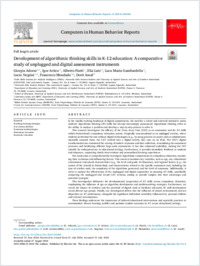Development of algorithmic thinking skills in K-12 education : a comparative study of unplugged and digital assessment instruments
- Adorni, Giorgia ORCID Istituto Dalle Molle di studi sull'intelligenza artificiale (IDSIA), Facoltà di scienze informatiche, Università della Svizzera italiana, Svizzera
- Artico, Igor Facoltà di scienze informatiche, Università della Svizzera italiana, Svizzera
- Piatti, Alberto Department of Education and Learning (DFA), University of Applied Sciences and Arts of Southern Switzerland (SUPSI), Locarno, Switzerland
- Lutz, Elia School of Education, University of Applied Sciences and Arts Northwestern Switzerland (FHNW), Windisch, Switzerland
- Gambardella, Luca Maria Istituto Dalle Molle di studi sull'intelligenza artificiale (IDSIA), Facoltà di scienze informatiche, Università della Svizzera italiana, Svizzera
- Negrini, Lucio Department of Education and Learning (DFA), University of Applied Sciences and Arts of Southern Switzerland (SUPSI), Locarno, Switzerland - Laboratory media and MINT, Department of Education and Learning (DFA), University of Applied Sciences and Arts of Southern Switzerland (SUPSI), Locarno, Switzerland
- Mondada, Francesco Mobile Robotic Systems Group (MOBOTS), Ecole Polytechnique Fédérale de Lausanne (EPFL), Switzerland - Center for Learning Sciences (LEARN), Ecole Polytechnique Fédérale de Lausanne (EPFL), Switzerland
- Assaf, Dorit School of Education, University of Applied Sciences and Arts Northwestern Switzerland (FHNW), Windisch, Switzerland
- 2024
Published in:
- Computers in human behavior reports. - 2024, vol. 15, no. August, p. 100466
Teaching/learning strategies
21st century abilities
Evaluation methodologies
Elementary education
Secondary education
English
In the rapidly evolving landscape of digital competencies, the need for a robust and universal method to assess students’ algorithmic thinking (AT) skills has become increasingly pronounced. Algorithmic thinking refers to the ability to analyse a problem and develop a step-by-step process to solve it. This research investigates the efficacy of the Cross Array Task (CAT) as an assessment tool for AT skills within Switzerland’s compulsory education system. Originally conceptualised as an unplugged activity, where students performed the task without digital technologies (e.g., by using gestures on paper) and an administrator manually assessed them, the CAT evolved into a digital activity that runs on an iPad. The CAT’s digital transformation has automated the scoring of student responses and data collection, streamlining the assessment processes and facilitating efficient large-scale assessments. It has also enhanced scalability, making the CAT suitable for widespread use in educational settings. Furthermore, it provides immediate feedback to students and educators, supporting timely interventions and personalised learning experiences. Our study aims to comprehensively investigate algorithmic competencies in compulsory education, examining their variations and influencing factors. This research examines key variables, such as age, sex, educational environment and school characteristics (e.g., the level and grade of education), and regional factors (e.g., the canton of the school) in Switzerland, and characteristics related to the specific assessment tool, including the type of artefact used, the complexity of the algorithms generated, and the level of autonomy. Additionally, it seeks to analyse the effectiveness of the unplugged and digital approaches in assessing AT skills, specifically comparing the unplugged and virtual CAT versions, aiming to provide insights into their advantages and potential synergies. This investigation delineates the developmental progression of AT skills across compulsory education, emphasising the influence of age on algorithm development and problem-solving strategies. Furthermore, we reveal the impact of artefacts and the potential of digital tools to facilitate advanced AT skill development across diverse age groups. Finally, our investigation delves into the influence of school environments and sex disparities on AT performance, alongside the significant individual variability influenced by personal abilities and external circumstances. These findings underscore the importance of tailored educational interventions and equitable practices to accommodate diverse learning profiles and optimise student outcomes in AT across educational settings.
- Collections
- Language
-
- English
- Classification
- Computer science and technology
- Related to
- License
- Open access status
- gold
- Identifiers
-
- DOI 10.1016/j.chbr.2024.100466
- ARK ark:/12658/srd1329324
- Persistent URL
- https://n2t.net/ark:/12658/srd1329324
Statistics
Document views: 137
File downloads:
- Adorni_2024_Elsevier_Comp in Human Behav_Development of algorithmic: 83
